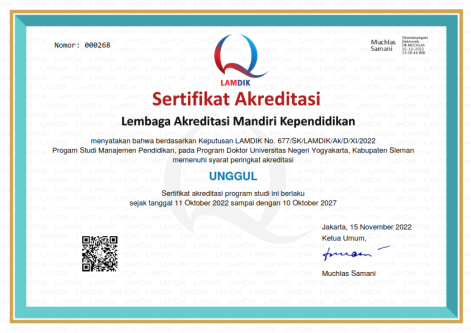Learning Outcomes (PLO)
Primary tabs
Learning Outcomes (PLO) of the Doctoral Program in Educational Management, Faculty of Education, Universitas Negeri Yogyakarta
This doctoral program has six graduate learning outcomes (PLO) that reflect academic and professional mastery in three concentrations: Educational Leadership, Educational Quality Assurance, and Educational Institutional Management. These outcomes are also aligned with the vision of the program, which focuses on the development of knowledge, policies, and educational practices based on the values of excellence, equity, and local-global wisdom within diversity.
| No | Description of Learning Outcomes (CPL) |
|---|---|
| a. | Able to identify and embody ethical values, excellence, equity, and local-global wisdom within diversity.
Graduates are able to identify and apply ethical values and social justice derived from local and global wisdom in the development of educational knowledge, policy, and practice.
|
| b. | Master educational leadership theories and their developments, and utilize them for research and policymaking.
Graduates master both traditional and contemporary educational leadership theories and integrate them into the formulation of educational policies and learning strategies.
|
| c. | Able to critically analyze, evaluate, and adapt leadership and educational management theories for learning transformation and organizational change.
Graduates possess the ability to critique and evaluate leadership and management theories to transform educational practices and organizations.
|
| d. | Master research methodologies and able to design and conduct original and rigorous scientific research.
Graduates master various research methodologies and are capable of designing original and relevant research that advances theory and practice in educational leadership and management.
|
| e. | Able to produce scientific research and publications independently or collaboratively.
Graduates can produce high-quality scientific research, independently or collaboratively, that enriches the body of theory and practice in education.
|
| f. | Able to provide professional consulting services to educational institutions.
Graduates are capable of providing consulting services to government and private educational institutions in developing strategic educational policies and programs, as well as managing organizational resources effectively.
|
AKREDITASI

Sertifikat dapat diunduh disini.
Kontak S3 MP FIP UNY
Program Studi S3 Manajemen Pendidikan
Fakultas Ilmu Pendidikan
Universitas Negeri Yogyakarta
Jl. Colombo No.1, Yogyakarta, Daerah Istimewa Yogyakarta 55281
Website: https://s3mp.fip.uny.ac.id/
Email: s3mp@uny.ac.id
Instagram
Facebook
Youtube
Copyright © 2026,



